
Home
Stories
Links
Guestbook
Forum
Contact us


Notice: Undefined index: last in /home/rbbw2/8.rbbw2.z8.ru/docs/content.php on line 7
- 2019-2020
- The geography
- base of Complex Seismological Expedition
- Garm
- Shul
- Chusal, Khait, North profile
- Dzhirgital, Tadjikabad
- Novobad, Komarou
- Runou, Kul, the other side of Surkhob
- Obikhingou, South profile
- Голубой берег, дорога на Душанбе, Оби-Гарм
- Dushanbe
- Varzob, Nurek
- Landscapes
- Pamir
- Talgar
- Киргизия
- Moscow
- Athens
- Krasnodar
- Magadan
- USA
- Family photocollections of
- Гарм спустя 30 лет...
- Ретро-альбом Зои Халтуриной
- Юрия Алексеенко
- Oleg Lapeha
- Timur Sinchileev
- Kourov Viktor
- Semenov A.
- Mirzoev Davlat
- Александра Попова, оператора МГД отряда.
- Зокирова Хусейна
- Владимира Фомина (hazorskiy)
- Baklushina Irina
- Haled Hametov
- Глушковых
- Sergej Pautov
- Semenikhins
- Ira Kiseleva
- Sherali Jononov
- Ushaevs
- Akbar Nazriev
- Evgeniya Umarova
- Dosalievs
- Dmitry Maximov
- Iya Shengelia
- Daler Makhmadov
- Nikolay Ponomaryov
- Golubevs
- Bakhtiyor Rakhmonov
- Gazizovs
- Segey Aptikaev
- Galina Bikova
- Tamara Guseva
- Tanya Zhavoronkova
- Olga & Masha Pavlov
- Olga Nikifirova
- Vitaly "Stefanich" Ponomarev
- Vladimir Zhuravlev
- Alik Lukk
- Alex Borovikov
- Vova Malishev
- Vladik Martynov
- Sergey Kutenets
- Stas Pisarev
- Ruzaykins
- Lyuba Chepkunas
- Alisher Partoev
- Artiom Suhodolov
- Kunakovs
- Olga Krivosheeva-Malkova
- Viktor & Andrey Nesterenko
- Filippovs
- Peter Molnar
- Khalturins
- Unknown sources
- People
- Children
- Group photos
- Our Americans
- Sport - soccer, volley-ball...
- People from stations
- ChISS
- МГД-отряд
- Hikes
- Great gardeners
- So young, so beautiful
- Big Love
- Wow!!!
- Первым делом, первым делом - вертолеты...
- Дембельский альбом
- Great scientists
- Portraits
- International friendship
- People from Garm & Shul
- People from Talgar
- In memorium
- Evidences of the era
- Today
- Jokes
- НОВОЕ
Dear friends! Welcome to the Garm web site!
Since you are already here, then there is no need to explain what does Garm and К.С.Э. mean... You remember that it means beautiful mountains, fresh air, hot sun, and hot discussions about life, love, science, and politics. It means a lot of Plov, Vodka, friends, soccer matches and singing songs. Maybe, the beautiful mountains and good friends were more important, than seismology.
Thank you for being TOGETHER with us during those happy-happy days! Many-many years have passed, there is no К.С.Э. now, but we still remember Garm, and we still remember you. We still are your friends!
If you would like to add your photos or memoirs to this site, please, write us!
Olga Khalturina & Maya Khalturina
:))
Peter MOLNAR. The base at Garm brought much nostalgia... English/Russian
Это письмо Питер Молнар прислал, вернувшись из поездки по Таджикистану. Мы приводим текст письма и по-английски, и в русском переводе. Переводили собственными силами, так что просим простить за возможные погрешности. Все фотографии, сделанные Питером, вы можете увидеть в разделе photos by Peter Molnar.
=========
To: Tanya Rautian
From: Peter Hale Molnar
Subject: Garm
Cc: Tanya Atwater, Fred Fischer, Michael Hamburger, Denis Hatzfeld, Vladik Martynov, Zhora Popandopola, Steve Roecker, David Simpson, Brian Tucker, and Rob Wesson
I am home from a trip to Tajikistan. I visited Garm and other places, and although I suspect that you know most of what I write below, something in this long message might be new to you. Because this may interest others who worked in Garm, I send them copies.
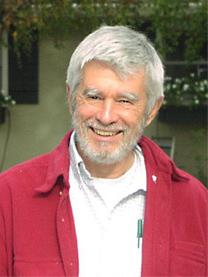
First, everyone knew of Vitaly's fate, and all expressed sorrow when we discussed it. I had not realized that when he was there 2 1/2 years ago, he spent a long time in the hospital with heart problems. Many mentioned this. I guess therefore that some were not surprised by his death, if still I could see the pain in their faces.
I was there to help Becky Bendick (young scientist now at the University of Montana) and colleagues from Tajikistan and Kyrgyzstan set up a GPS network for future research. This was a project that I hoped to help someone start after Vitaly returned 2 1/2 years ago. Vitaly urged me to find a way to help Tajikistan. Finally, I found Becky, and she is an excellent person to carry this forward. Anyhow, I traveled much more in Tajikistan than I ever did while working in Garm in the 1970s.
Many names have been changed, such as Leninabad or Ordzhokonidzebad, but also for less clear reasons, the Garm region is now called "Rasht." The town is still Garm, however. The anti-Soviet reaction is clear, and the pro-Islam attitude is also widespread.
I saw Sobit Negmatulaev briefly, in Dushanbe. He now manages a non-governmental organization that has installed some broadband seismographs in places like Garm and will install a couple more for a total of 6 (I think). He apparently is still not married and trying to be active, though I am not sure how much he really does.
The base at Garm brought much nostalgia, as you can imagine. The place is easily recognized, but only partly whole. The street where we lived is still intact. All of the buildings are there, and most are inhabited. The trees have grown tall, so that most houses are shielded from the street. Tolib, the mechanic and driver whom I knew and who sometimes played football with us, now lives in the "Amerikanski dom" with a second family. The place looks beautiful with roses planted in the front and a vegetable garden on the west side. Plumbing seems to have fallen aside, as the toilet is now outside in the back (on the east side) - an "outhouse" as we call it in English. Tolib told me that he put a lot of work into fixing the house, but because he no longer works for TISSS, he might be expelled at some time. He pays no rent. He now drives a "taxi" from Garm to Dushanbe one day, and back to Garm the next.
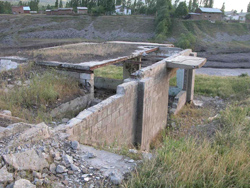 Most people living on the base do not work for TISSS (nor, of course, for the "Complex Seismological Expedition," which disappeared with the Soviet Union). Someone not associated with the base lives in Nersesov's old house. He seems to be wealthy, by Tajik standards, and he has kept the exterior of Nersesov's house in good shape. I am not sure who lives in your old house, but it too seems to be cared for well.
Most people living on the base do not work for TISSS (nor, of course, for the "Complex Seismological Expedition," which disappeared with the Soviet Union). Someone not associated with the base lives in Nersesov's old house. He seems to be wealthy, by Tajik standards, and he has kept the exterior of Nersesov's house in good shape. I am not sure who lives in your old house, but it too seems to be cared for well.
Another Tajik who worked on the base when I was there, Zainitdin Sirozhev, seems to be one of two people who work for TISSS and live on the base. He is responsible for the seismograph station there. He worked for Sidorin years ago. I do not recall meeting him, but of course, he knew everyone. He asked about you, and about Brian, about Rob and Fred, and about Zhora too. He lives at the eastern end of the building where Zhora lived. Again, the place is green with trees and flowers and with vegetables. Behind the house, not only does he grow vegetables, but also he keeps a cow and some chickens, plus maybe other livestock. The grape vines that shade the area behind the house are huge: at the base two branches, each 25 cm in diameter, climb onto the pergola behind the house.
A couple of buildings just west of the road at the entrance of the base also seem to me to be in good condition. Trees surround them, and they seem to be maintained well and occupied.
Nearly everything else is destroyed.
The kameralka (the building where we worked - where your office was, where "mine" was, and where Brian had his computer) is destroyed. The southern end is just rubble. The northern end is a shell. Steps at the south end still lead into a basement, but I did not dare try to descend into it.
The dining hall ("stolovaya") also is just a shell with no roof. Boris Pavlovich's house, which had two floors, is a shell with just the floor left. The swimming pool is there, but not used. Some equipment is part of it, and mud fills the bottom. The old bathhouse is destroyed; only the pipes and furnaces remain. The garages behind the base, which blocked errant soccer balls (footballs), is totally destroyed.
There is one new item back southeast of the garages - a rusting tank. In fact, we saw remnants of tanks all over. Becky counted 14 in the little valley where Tavil Dora is. I saw a comparable number along the Obikhingou west of Tavil Dora. Remnants of war are hard to miss.
The statue at Khait was a casualty too. The head lies in the deep grass beneath the remnants of the body.
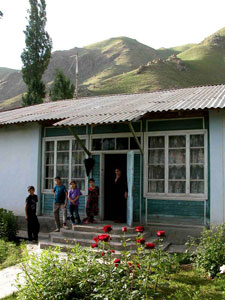 Apparently Garm was a hotspot in the civil war. No fighting at all occurred in the area near Khorog and somewhat north of it. Apparently, religion played a role in the civil war, with the opposition being much more fervently Moslem than the government, especially the government in Soviet times.
Apparently Garm was a hotspot in the civil war. No fighting at all occurred in the area near Khorog and somewhat north of it. Apparently, religion played a role in the civil war, with the opposition being much more fervently Moslem than the government, especially the government in Soviet times.
Tolib told me that he is quite religious and prays five times a day, but in Soviet times, this was hard to do. One had to do it secretly. (Tolib apparently shares the same root as the word Taliban, suggesting that his family was seriously religious.) He said that for a few days, the government forces set up east of the base, and the opposition was west of it and in the hills above the base. For a few days they could not leave the house even to get water, of food of course. He was shot - a bullet passed through his abdomen. His wife showed me the scar from a bullet through her arm. Worst, his young son took a serious wound in the buttocks, and apparently it has taken sever operations to prevent him from being an invalid.
Land mines have taken many legs off people, and still every once in a while a cow is blown up. We saw signs elsewhere warming of land mines.
Although I was surprised to find Dushanbe to be a pretty city, with many trees and many attractive buildings (because I remember an ugly city), and with little evidence of poverty, the infrastructure of the country seems to be decaying. Roads are terrible. Still it takes 5 hours to drive from Dushanbe to Garm. East of Garm, roads were worse. Only in Dushanbe did we see a gas station where gas was pumped into gas tanks of cars. In most places gasoline was stored in jerry cans or big temporary containers, and it was measured using buckets. With a funnel it was transferred to cars.
Not surprisingly, everyone is poor. Salaries are ~$30/month. Teachers earn no more. Zanitdin receives less from TISSS. So, most have two jobs. Everyone whom I asked said that life was much better in Soviet times. Most thought that Putin is very good, at least for Russia. Of course, all thought Gorge Bush was the worst they could imagine. (Who could argue with that, except that they think he actually makes decisions; they did not seem to realize that he is a puppet.)
Yet, some things never change. Tajik hospitality is every bit as generous as it was 30 years ago. We were always fed well when we were guests, which proved to be often. Such experiences were a sweet reminder of how good life was in Garm 30 years ago.
I have some photos, which I will send to you.
Peter
=============
Я уже вернулся домой из поездки в Таджикистан. Я был в Гарме и некоторых других местах, и хотя многое из того, о чем я тут пишу, вам, наверное, известно, но я надеюсь, что кое-что в этом длинном послании окажется новым. Это может заинтересовать всех тех, кто работал в Гарме, поэтому я посылаю копии Тане, Фреду, Майклу, Дэнису, Владику Мартынову, Жоре Попандопуло, Стиву, Дэвиду и Робу.
Во-первых, все там знают о кончине Виталия Халтурина и выражали свои соболезнования, когда об этом шла речь. Я и не знал, что он провел много времени в больнице из-за проблем с сердцем, когда был здесь два с половиной года назад. Многие упоминали об этом. Я полагаю, что для некоторых известие о его смерти не было неожиданностью, хотя я и видел боль в их глазах.
Я ездил, чтобы помочь Бекки Бендик (она - молодой ученый из университета Монтана) и коллегам из Таджикистана и Кыргызстана создать GPS сеть для будущих исследований. Я надеялся способствовать тому, чтобы кто-то начал этот проект после возвращения Виталия из Таджикистана два с половиной года назад. Виталий призывал меня найти способ помочь Таджикистану. Наконец, я нашел Бекки, и она является прекрасным кандидатом, чтобы развивать этот проект. Как бы там ни было, я путешествовал по Таджикистану гораздо больше, чем когда-либо ранее, работая в Гарме в 1970-ых годах.
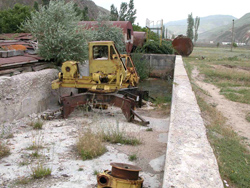 Многие названия были изменены, например Ленинабад и Орджоникидзеабад, и по менее ясной причине Гармский район теперь называется Рашт. Однако, поселок по-прежнему зовется Гарм. Антисоветская реакция видна очень явно, про-исламские настроения также широко распространены.
Многие названия были изменены, например Ленинабад и Орджоникидзеабад, и по менее ясной причине Гармский район теперь называется Рашт. Однако, поселок по-прежнему зовется Гарм. Антисоветская реакция видна очень явно, про-исламские настроения также широко распространены.
У меня была короткая встреча в Душанбе с Собитом Негматуллаевым. Сейчас он руководит неправительственной организацией, которая установила несколько сейсмографов в таких местах, как Гарм, и собирается установить еще несколько – в общей сложности шесть. Он до сих пор не женат и старается быть активными, хотя я и не знаю, насколько много он в действительности делает.
База в Гарме вызвала много ностальгии, как вы можете себе представить. Место легко узнаваемо, но лишь частично сохранилось невредимым. На улице, где мы жили, все по-прежнему без изменений. Все дома стоят, и большинство из них обитаемы. Деревья выросли такими высокими, что загораживают дома от улицы. Толиб, тот механик и водитель, которого я знал и который иногда играл с нами футбол, теперь живет в американском доме ("Amerikanski dom") вместе с еще одной семьей. Место выглядит красивым - розы перед домом и огород с западной стороны. Сантехника разрушена и туалет теперь снаружи, за домом. Толиб сказал мне, что приложил много сил для сохранения дома, но так как он больше не работает в ТИСССе, то его могут выселить. Он не платит арендную плату. Сейчас он водит «такси» - один день едет из Гарма в Душанбе, другой день обратно.
Большинство людей, живущих на базе, не работают в ТИСССе (и, разумеется, в «Комплексной сейсмологической экспедиции», которая исчезла одновременно с Советским Союзом). Кто-то, не связанный с базой, живет в бывшей квартире Нерсесова. Он, кажется, довольно богат по таджикским стандартам, и сохранил внешний вид дома в хорошем состоянии. Я не знаю, кто живет в бывшей квартире Халтуриных, но у нее тоже ухоженный вид.
Другой таджик, который работал на базе в те времена, когда я был там, - Зайнитдин Сероджиев, является один из двух людей, работающих в ТИСССЕ и живущих на базе. Он отвечает за сейсмостанцию. Он работал у Сидорина. Я не помню, чтоб встречал его, но он, конечно, знал всех. Он спрашивает про всех вас, про Брайана, Роба, Фреда и Жору. Он живет в восточной части того дома, где жил Жора. Вокруг все зелено из-за деревьев, цветов и огородов. За домом он не только выращивают овощи, но и держит корову, кур и, может быть, других домашних животных. Виноград, который давал тень позади дома, стал огромным: ветки от двух стволов, каждый по 25 см в диаметре, обвивают виноградник.
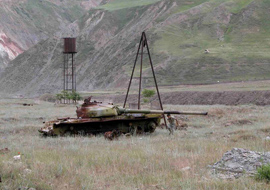 Несколько зданий к западу от дороги, ведущей от ворот на базу, также, кажется, в хорошем состоянии. Деревья окружают их, и они выглядят обитаемыми.
Несколько зданий к западу от дороги, ведущей от ворот на базу, также, кажется, в хорошем состоянии. Деревья окружают их, и они выглядят обитаемыми.
Почти все остальное разрушено.
Здание, где мы работали, где был мой "кабинет" и где стоял компьютер Брайана - «kameralka» - разрушено. От южной его части остался только щебень. От северной - одни стены. Сохранилась лестница, ведущая в подвал с южной стороны, но я не рискнул спуститься туда.
От столовой («stolovaya») также остался лишь остов, без крыши. От двухэтажного дома Бориса Павловича остались только стены и пол. Бассейн есть, но не используется. В него свалены машины и грязь заполняет дно. Старая баня разрушена; только трубы и печи остались. Гараж, в который попадали улетающие футбольные мячи, полностью разрушен.
Новая деталь пейзажа к юго-востоку от гаражей – ржавеющий танк. На самом деле остатки танков мы видели везде. Бекки насчитала их 14 в небольшой долине около Тавиль-Доры. Я видел почти столько же вдоль Обихингоу к западу от Тавиль- Доры. Пережитки войны трудно не заметить.
Статуя в Хаите тоже пострадала. Голова скульптуры валяется в глубокой траве под останками тела.
Видимо, в Гарме было много «горячих точек» во время гражданской войны. Места, где не было боевых действий, встречались около Хорога и немного к северу от него. Очевидно, что религия играла большую роль в гражданской войне, когда оппозиция была гораздо более про-мусульманской, чем правительство, особенно правительство советских времен.
Толиб сказал мне, что он очень религиозен и молится пять раз в день, но в советские времена это было трудно сделать, если только тайно (имя Толиб имеет тот же корень, что и слово "талибан", что свидетельствует о том, что его семья была очень религиозна). Он сказал, что в течение нескольких дней правительственные войска располагались к востоку от базы, а оппозиции была западе, и на горах. В течение нескольких дней они не могли выходить из дома даже для того, чтобы раздобыть воду и продовольствие. Он был ранен пулей в живот. Его жена показала мне шрам от пули на руке. Самое тяжелое ранение получил его младший сын (в ягодицы), и, по-видимому, перенес несколько серьезных операций, благодаря которым он не остался инвалидом.
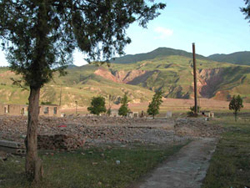 Из-за наземных мины многим людям оторвало ноги и однажды на мине подорвалась корова. Мы видели много следов мин.
Из-за наземных мины многим людям оторвало ноги и однажды на мине подорвалась корова. Мы видели много следов мин.
Хотя я и был приятно удивлен, обнаружив, что Душанбе стал довольно милым городом (я-то помню, что это был ужасный город) со множеством деревьев, симпатичных зданий и почти без свидетельств нищеты, тем не мене, мне кажется, что инфраструктура страны находится в упадке. Дороги ужасные. Поездка от Душанбе до Гарма занимает пять часов. Восточнее Гарма дороги еще хуже. Только в Душанбе мы видели заправочную станцию, где топливо подается из цистерны в бак автомобиля. В большинстве других мест бензин хранится в канистрах или больших временных контейнерах, и измеряется с помощью ведра. Через воронку бензин наливают из ведра в бак.
Неудивительно, что все очень бедны. Зарплаты составляют 30 $ в месяц. Учителя получают не более того. Зайнитдин получает и того меньше в ТИСССе. Поэтому большинство работает на двух работах. Все, которого я спрашивал, говорили, что жизнь была намного лучше в советские времена. Большинство считает, что Путин очень хорош, по крайней мере, для России. Разумеется, все считают, что Джордж Буш – наихудшее, что можно себе вообразить (этого нельзя оспорить, за исключением того факта, что все они думают, будто Буш в действительно принимает решения, и не понимают, что он является марионеткой).
Тем не менее, некоторые вещи никогда не меняются. Таджикское гостеприимстве столь же щедрое, как и 30 лет назад. Нас всегда хорошо кормили, когда мы были гостями, что оказывалось очень часто. Такой опыт были сладким напоминанием о том, как хороша была жизнь в Гарме 30 лет назад.
У меня есть несколько фотографий, которые я отправлю вам.
Питер
Notice: Uninitialized string offset: 0 in /home/rbbw2/8.rbbw2.z8.ru/docs/story.php on line 37
Notice: Uninitialized string offset: 0 in /home/rbbw2/8.rbbw2.z8.ru/docs/story.php on line 37
Notice: Undefined index: pf in /home/rbbw2/8.rbbw2.z8.ru/docs/story.php on line 59
Notice: Undefined index: name in /home/rbbw2/8.rbbw2.z8.ru/docs/lib.php on line 197
Notice: Undefined index: email in /home/rbbw2/8.rbbw2.z8.ru/docs/lib.php on line 199
Add your opinion
- 14.05.2019. Гарм КСЭ через 30 лет.
Дорог... - 18.01.2014. Питер Молнар - лауреат премии ...
- 21.04.2011. Медаль Рида - Татьяне Раутиан!...
- 08.11.2009. Первым делом - вертолеты...
... - 31.01.2009. Обновления на сайте! Новые ссы...
All feedback
Latest feedback:
- Алишо, ты обещал узнать про Пирмахма...
Помню Бориса Палыча Волина - при нем...
Спасибо, девочки, за сайт! Я там род...
Привет...
Спасибо за ваш сайт. Я бывал в Гарме...
Работали на станциях Хаит, Чусал, Но...
5507...
Мой адрес V_usenko@ukr.net...
Добрый день, Анатолий! Прими мои соб...
Как определить дату этого снимка? Ви...
Мой дед, Виталий Пономерев умер 17.0...
Мне очень понравился это сайт. Спаси...
Великолепная фотография. Спасибо!...
Потерялся Виталий Стефанович. Если е...
Любимый дедушка, лучший человек на с...
Спонсор сайта - интернет-магазинчик "Для пышных красавиц"

Сайты наших друзей и земляков:
---------------------------------
Анастасия Коляда, она же Стася, внучка В.И.Халтурина, инструктор по горным лыжам, научит вас кататься на лыжах и сноуборде:
